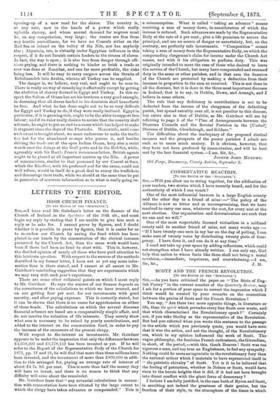LETTERS TO THE EDITOR.
IRISH CHURCH FINANCE.
[TO THE EDITOR OF THE "SPECTATOR.")
Stn,—I have read Mr. Gairdner's letter on the finance of the Church of Ireland .in the Spectator of the 30th ult., and must begin my reply by stating that I am unable to give him such a reply as he asks for. I cannot prove by figures, and I doubt whether it is possible to prove by figures, that it is easier for us to re-endow our Church by saving the fund which has been placed in our hands by the commutation of the clerical incomes preserved by the Church Act, than the same work would have been if there had been no fund to start with. This is, however, the decided opinion of nearly all those who have paid attention to this intricate question. With respect to the success of the methods described in my former letter, I have not as yet any more infor- mation than is there stated, and I cannot at all assent to Mr. Gairdner's concluding suggestion that they are experiments which we may vary with each year's experience.
There are some other collateral points on which I must reply to Mr. Gairdner. He says the success of our finance depends on the correctness of the calculations to which we have trusted, and on our getting four per cent. for our investments with good security, and after paying expenses. This is correctly stated, but it can be shown that there is no cause for apprehension on either of these heads. The calculations on which the several diocesan financial schemes are based are a comparatively simple affair, and do not involve the valuation of life interests. They merely show what sum is necessary to be raised by yearly contributions, and added to the interest on the commutation fund, in order to pay the incomes of the successors of the present clergy.
With respect to the interest on investments, Mr. Gairdner appears to be under the impression that only the difference between £4,658,221 and £3,778,152 has been invested as-yet. If he will refer to the Report of the Representative Body of the Church for 1873, pp. 17 and 21, he will find that more than three millions have been invested, and the investment of more than £800,000 in addi- tion to this arranged for, paying an average rate of interest of about £4 75. 9d. per cent. This is more than half the money they will have to invest, and there is no reason to think that any diffiulty will arise about the remainder.
Mr. Gairdner fears that " any actuarial calculations in connec- tion with commutation have been vitiated by the large extent to which the clergy have taken advances or compounded." Tails is a misconception. What is called "taking an advance" means receiving a sum of money down, in consideration of which the income is reduced. Such advances are made by the Representative Body at the rate of 4 per cent., plus a life premium to secure the- principal, and are no source of danger or uncertainty, but, on the contrary, are perfectly safe investments. " Composition " means taking a sum of money from the Representative Body, on which the compounding clergyman's claim for income under the Church Act ceases, and with it his obligation to perform duty. This was originally intended to meet the case of those who desired to leave the service of the Church, but many have compounded and resumed' duty in the same or other parishes, and in that case the finances of the Church are protected by making a deduction from their incomes in proportion to the sum so received. This is not done in• all the dioceses, but it is done in the three most important dioceses in Ireland, that is to say, in Dublin, Down, and Armagh, and I believe in some others.
The rule that any deficiency in contributions is not to be deducted from the income of the clergyman of the defaulting parish, but spread rateably over all, is not peculiar to this diocese, but exists also in that of Dublin, as Mr. Gairdner will see by referring to page 5 of the " Plan of Arrangements between the Diocesan Councils and the Several Parishes in the [United j: Dioceses of Dublin, Glendalough, and Kildare."
The difficulties about the inadequacy of the proposed clerical' incomes and the prospects of the poorer parishes I admit are- such as to cause much anxiety. It is obvious, however, that they have not been produced by commutation, and will be best met by the best financial system.—I am, Sir, &c.,
JOSEPH JOHN MURPHY;
Old Forge, Dunmurry, County Antrim, September 3.






























 Previous page
Previous page